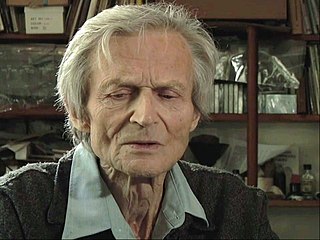In mathematics, particularly set theory, a finite set is a set that has a finite number of elements. Informally, a finite set is a set which one could in principle count and finish counting. For example,

Stefan Banach was a Polish mathematician who is generally considered one of the 20th century's most important and influential mathematicians. He was the founder of modern functional analysis, and an original member of the Lwów School of Mathematics. His major work was the 1932 book, Théorie des opérations linéaires, the first monograph on the general theory of functional analysis.

Kazimierz Kuratowski was a Polish mathematician and logician. He was one of the leading representatives of the Warsaw School of Mathematics. He worked as a professor at the University of Warsaw and at the Mathematical Institute of the Polish Academy of Sciences. Between 1946 and 1953, he served as President of the Polish Mathematical Society.

Alfred Tarski was a Polish-American logician and mathematician. A prolific author best known for his work on model theory, metamathematics, and algebraic logic, he also contributed to abstract algebra, topology, geometry, measure theory, mathematical logic, set theory, and analytic philosophy.

Hugo Dyonizy Steinhaus was a Polish mathematician and educator. Steinhaus obtained his PhD under David Hilbert at Göttingen University in 1911 and later became a professor at the Jan Kazimierz University in Lwów, where he helped establish what later became known as the Lwów School of Mathematics. He is credited with "discovering" mathematician Stefan Banach, with whom he gave a notable contribution to functional analysis through the Banach–Steinhaus theorem. After World War II Steinhaus played an important part in the establishment of the mathematics department at Wrocław University and in the revival of Polish mathematics from the destruction of the war.

Jan Łukasiewicz was a Polish logician and philosopher who is best known for Polish notation and Łukasiewicz logic. His work centred on philosophical logic, mathematical logic and history of logic. He thought innovatively about traditional propositional logic, the principle of non-contradiction and the law of excluded middle, offering one of the earliest systems of many-valued logic. Contemporary research on Aristotelian logic also builds on innovative works by Łukasiewicz, which applied methods from modern logic to the formalization of Aristotle's syllogistic.

Zygmunt Janiszewski was a Polish mathematician.

Stanisław Saks was a Polish mathematician and university tutor, a member of the Lwów School of Mathematics, known primarily for his membership in the Scottish Café circle, an extensive monograph on the theory of integrals, his works on measure theory and the Vitali–Hahn–Saks theorem.

Stanisław Leśniewski was a Polish mathematician, philosopher and logician.

The Lwów school of mathematics was a group of Polish mathematicians who worked in the interwar period in Lwów, Poland. The mathematicians often met at the famous Scottish Café to discuss mathematical problems, and published in the journal Studia Mathematica, founded in 1929. The school was renowned for its productivity and its extensive contributions to subjects such as point-set topology, set theory and functional analysis. The biographies and contributions of these mathematicians were documented in 1980 by their contemporary, Kazimierz Kuratowski in his book A Half Century of Polish Mathematics: Remembrances and Reflections.

Andrzej Mostowski was a Polish mathematician. He is perhaps best remembered for the Mostowski collapse lemma.

Adolf Lindenbaum was a Polish-Jewish logician and mathematician best known for Lindenbaum's lemma and Lindenbaum–Tarski algebras.
The Lwów–Warsaw School was an interdisciplinary school founded by Kazimierz Twardowski in 1895 in Lemberg, Austro-Hungary.
Fundamenta Mathematicae is a peer-reviewed scientific journal of mathematics with a special focus on the foundations of mathematics, concentrating on set theory, mathematical logic, topology and its interactions with algebra, and dynamical systems.

Donald Anthony Martin, also known as Tony Martin, is an American set theorist and philosopher of mathematics at UCLA, where he is an emeritus professor of mathematics and philosophy.
Tarski–Grothendieck set theory is an axiomatic set theory. It is a non-conservative extension of Zermelo–Fraenkel set theory (ZFC) and is distinguished from other axiomatic set theories by the inclusion of Tarski's axiom, which states that for each set there is a Grothendieck universe it belongs to. Tarski's axiom implies the existence of inaccessible cardinals, providing a richer ontology than ZFC. For example, adding this axiom supports category theory.
Andrzej Ehrenfeucht is a Polish-American mathematician and computer scientist.

Andrzej Grzegorczyk was a Polish logician, mathematician, philosopher and ethicist. He was noted for his work in computability, mathematical logic and the foundations of mathematics.
Wanda Szmielew née Montlak was a Polish mathematical logician who first proved the decidability of the first-order theory of abelian groups.
Henryk Hiż was a Polish analytical philosopher specializing in linguistics, philosophy of language, logic, mathematics and ethics, active for most of his life in the United States, one of the youngest representatives of the Lwów–Warsaw school.












